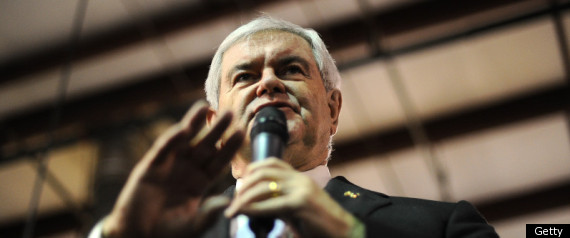Results 1 to 3 of 3
Thread Information
Users Browsing this Thread
There are currently 1 users browsing this thread. (0 members and 1 guests)
-
12-24-2011, 11:13 AM #1Senior Member


- Join Date
- May 2007
- Location
- South West Florida (Behind friendly lines but still in Occupied Territory)
- Posts
- 117,696
Newt Gingrich Fails To Qualify For Virginia GOP Primary
Newt Gingrich Fails To Qualify For Virginia GOP Primary Despite Residency [UPDATED]

First Posted: 12/24/11 08:32 AM ET Updated: 12/24/11 10:01 AM ET
WASHINGTON - The Republican Party of Virginia announced early Saturday that GOP presidential hopeful Newt Gingrich failed to amass the 10,000 signatures needed in order to secure a place on the ballot in the party's March 6th primary election. Gingrich isn't the first Republican presidential candidate who failed to qualify for the "Super Tuesday" primary contest - on Friday, Texas Gov. Rick Perry also failed to make the cut for the same reason. Rival candidates Mitt Romney and Rep. Ron Paul (R-Texas) qualified for the primary. On the Democratic side, President Barack Obama qualified earlier this year.
The failure is a particularly tough blow to Gingrich, who is a Virginia resident, having lived in the Washington suburb of McLean, Va. for more than a decade. Gingrich said earlier this week that he had reached the 10,000 signatures needed to appear on the ballot, but after a review of his 11,050 signatures, the Republican Party of Virginia announced in a tweet early Saturday that Gingrich "did not submit required 10k signatures and has not qualified for the VA primary."
A spokesman for Gingrich had yet to respond to an email early Saturday morning from The Huffington Post, but a Perry spokesman told NBC that their campaign would "closely review the facts and law to determine whether an appeal or challenge is warranted."
UPDATE [10:01 a.m. ET] - Early Saturday, Gingrich's campaign released the following statement from Campaign Director Michael Krull:"Only a failed system excludes four out of the six major candidates seeking access to the ballot. Voters deserve the right to vote for any top contender, especially leading candidates. We will work with the Republican Party of Virginia to pursue an aggressive write-in campaign to make sure that all the voters of Virginia are able to vote for the candidate of their choice."
Video at the link
http://www.huffingtonpost.com/2011/1...n_1168634.htmlLast edited by AirborneSapper7; 12-24-2011 at 11:25 AM.
Join our efforts to Secure America's Borders and End Illegal Immigration by Joining ALIPAC's E-Mail Alerts network (CLICK HERE)
-
12-24-2011, 11:22 AM #2Senior Member


- Join Date
- May 2007
- Location
- South West Florida (Behind friendly lines but still in Occupied Territory)
- Posts
- 117,696
Newt Gingrich Ethics Case From 15 Years Ago Leaves Scar

LARRY MARGASAK 12/24/11 08:41 AM ET
WASHINGTON — On Jan. 21, 1997, one of the most memorable days in congressional history, Newt Gingrich became the first House speaker to be reprimanded by his colleagues for ethical misconduct.
The 395-28 vote, to reprimand him for bringing discredit on the House for failing to ensure his use of tax-exempt groups was legal, was historic by itself. But Gingrich's peers didn't stop there. They fined him $300,000 for misleading the House ethics committee and causing it to extend a costly investigation.
Fifteen years later, the case has come back into focus as the fight for next year's Republican presidential nomination has resuscitated a political career once thought to be all but over.
The ethics committee back then made no finding on whether Gingrich's use of tax-exempt groups to raise money was illegal. It said it would let the Internal Revenue Service determine if any tax laws were broken. In 1999, the IRS said they were not.
In settling the case, Gingrich acknowledged he gave false information to the ethics committee in denying that a Republican political action committee he led – GOPAC – was connected to a college course he taught that was funded by tax-exempt organizations.
GOPAC, in fact, was involved in developing what was supposed to be a nonpartisan college course, the committee said, and Gingrich's denial was "inaccurate, incomplete and unreliable."
Gingrich said in recent comments on the campaign trail that more than 1 million pages of documents were turned over to the ethics committee that investigated him, and that 83 charges were repudiated as false. "The one mistake we made was a letter written by a lawyer that I didn't read carefully," he said.
But he also accused the ethics committee of being partisan and said, "The way I was dealt with related more to the politics of the Democratic Party than the ethics." The committee, then and now, has an equal number of Democrats and Republicans.
The ethics findings, unhappiness of many Republicans with his leadership, and his resignation as speaker after 1998 GOP election losses left Gingrich with scars that seemed to doom his political career. It didn't revive until last month, when the former speaker surged to the top among Republican presidential hopefuls.
Gingrich's ethics investigation consumed more than two years. Democrats were rabid in their insistence that the speaker broke House rules. And they wanted revenge. Years earlier, Gingrich and others had filed an ethics complaint against a Democratic speaker, Jim Wright – a case that led to Wright's resignation in 1989.
If Gingrich wins the GOP nomination, Democrats are certain to remind voters of this piece of baggage. The ethics report in 1997 portrayed him as unethical beyond the case at hand. Without details, it said that "over a number of years and in a number of situations, Mr. Gingrich showed a disregard and lack of respect for the standards of conduct that applied to his activities."
The genesis of Gingrich's ethics case goes back to 1990, when he was No. 2 in the House GOP hierarchy. Democrats had a stranglehold on the majority dating back to 1955, and Gingrich knew that If Republicans were ever to take back the House, they had to recruit hundreds of thousands of new voters.
He developed a television show in 1990 and a college course in 1993, using tax-exempt organizations to help finance them and spread his message: Replace the "welfare state" with an "opportunity society" centered in part on Republican, free enterprise economic principles.
"Based on the evidence, it was clear that Mr. Gingrich intended that the (television show and college course) have substantial partisan, political purposes," the ethics committee found.
That was a problem. U.S. tax law provides a way for people to make tax-deductible donations to certain groups as long as those groups stay away from partisan politics. The groups are often called 501c3s because that's the section of the IRS code that gives them tax-exempt status.
Gingrich's TV show and college course originally were a project of his GOPAC political action committee. But after they started consuming a substantial portion of the political committee's revenues, Gingrich and others transferred the project to the Abraham Lincoln Opportunity Foundation. The foundation was a tax-exempt 501(c)3 group that had been dormant but was revived to sponsor the televised workshop.
The foundation operated out of GOPAC's offices, and virtually all its officers and employers were simultaneously GOPAC officers or employees. The main difference between GOPAC and the foundation was the $260,000 in tax-deductible contributions the foundation raised to fund the TV program and the workshops.
Gingrich tried to protect his donors' tax deductions by keeping out references to Republicans and partisan politics in the TV show and college course. The course was taught originally at the public Kennesaw State College in Georgia in 1993 and the private Reinhardt College in 1994 and 1995. Gingrich and another professor each taught 20 hours.
The partisanship came in when Gingrich arranged "workshops" across the country for people to see his lectures and the TV show. A purpose of the workshops was to recruit voters who would support Republicans, the ethics committee said.
It cited documents in which Gingrich describes the purpose of the TV show and college course.
"The objective measurable goal is the maximum growth of news coverage of our vision and ideas, the maximum recruitment of new candidates, voters and resources, and the maximum electoral success in winning seats from the most local office to the White House," Gingrich wrote.
He said in numerous writings that the college course was part of his "Renewing American Civilization" movement to replace the "welfare state." The course and the movement had the same name.
In a 1993 document Gingrich said the goal of the movement was "replacing the welfare state, recruit, discover, arouse and network together 200,000 activists including candidates for elected office at all levels" leading to "a sweeping victory in 1996."
He didn't have to wait that long. In the 1994 election, Gingrich engineered a Republican takeover of the House. The GOP held the House majority for a dozen years until Democrats regained it in 2006. Last year, Republicans took it back.
Video at the link
http://www.huffingtonpost.com/2011/1...n_1168798.html
Join our efforts to Secure America's Borders and End Illegal Immigration by Joining ALIPAC's E-Mail Alerts network (CLICK HERE)
-
12-24-2011, 12:11 PM #3


 LinkBack URL
LinkBack URL About LinkBacks
About LinkBacks




 Reply With Quote
Reply With Quote

Listen to William Gheen on Rense Apr 24, 2024 talking Invasion...
04-25-2024, 02:03 PM in ALIPAC In The News